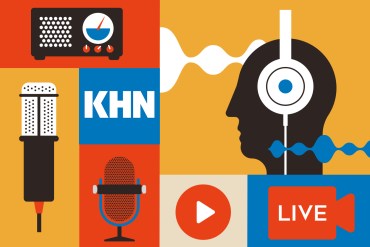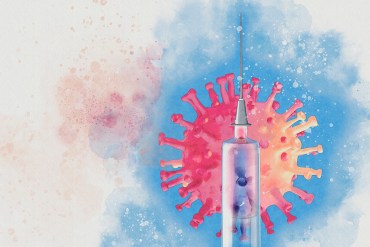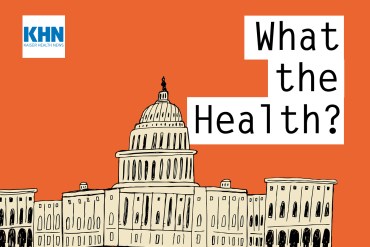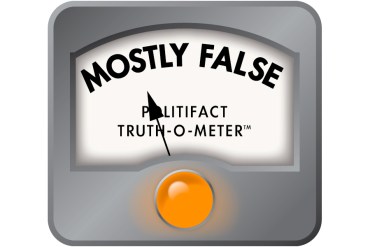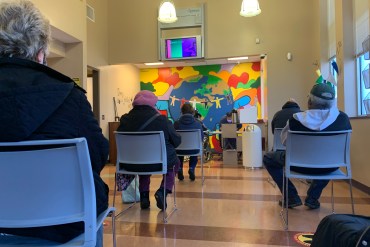Journalists Field Questions on Covid Coverage
KHN and California Healthline staff made the rounds on national and local media this week to discuss their stories. Here’s a collection of their appearances.
To Vaccinate Veterans, Health Care Workers Must Cross Mountains, Plains and Tundra
Veterans Affairs officials are flying COVID-19 vaccines to remote locations in Montana and Alaska to quickly inoculate rural veterans before the drugs expire.
Companies Pan for Marketing Gold in Vaccines
Some assisted living facilities, pharmacy chains and health care providers are luring new customers with covid shots.
KHN’s ‘What the Health?’: Open Enrollment, One More Time
Keeping a campaign promise, President Joe Biden has reopened enrollment for health coverage under the Affordable Care Act on healthcare.gov — and states that run their own health insurance marketplaces followed suit. At the same time, the Biden administration is moving to revoke the Trump administration’s permission for states to impose work requirements for some adults on the Medicaid health insurance program. Alice Miranda Ollstein of Politico, Kimberly Leonard of Business Insider and Rachel Cohrs of Stat join KHN’s Julie Rovner to discuss these issues and more. Also, Rovner interviews medical student Inam Sakinah, president of the new group Future Doctors in Politics.
Bay Area Cities Go to War Over Gas Stoves in Homes and Restaurants
Environmentalists say gas appliances spew greenhouse gases and exacerbate asthma. Restaurant owners and chefs say you can’t cook food properly with electricity.
Rural Hospital Remains Entrenched in Covid ‘War’ Even Amid Vaccine Rollout
Louisiana’s St. James Parish Hospital thought the vaccine would mean the end of its long covid fight. Then the ICU beds surrounding them ran out.
Prominent Scientists Call on CDC to Better Protect Workers From Covid
The academics insist that more workers should get top-rated N95 masks, the best defense against airborne coronavirus particles.
El discurso anti inmigrante complica la vacunación contra covid en estados del sur
Mientras el país se embarca en la abrumadora tarea de vacunar, a muchos funcionarios de salud se les dificulta la tarea de vacunar a 11 millones de indocumentados.
Anti-Immigrant Vitriol Complicates Vaccine Rollout in Southern States
Inoculating the millions of undocumented workers who produce America’s agricultural bounty will be key to achieving herd immunity against covid-19. But garnering the trust of these workers is proving complicated, particularly in the South, where the last four years have been marked by workplace raids and anti-immigrant vitriol.
Vaccines Go Mobile to Keep Seniors From Slipping Through the Cracks
A strike team of nurses and others is vaccinating Contra Costa County’s hardest-hit populations right where they live.
Can Pfizer and Moderna End the Pandemic by Sharing Their Vaccine Designs? It’s Not that Simple
Industry experts say it’s highly unlikely that dozens of pharmaceutical companies that aren’t already producing covid vaccines stand ready to do so.
S.D. Governor Gives State High Marks in Handling the Pandemic. Are They Deserved?
While South Dakota is excelling in vaccine distribution and in keeping its economy intact, some health measures show the state is also dealing with one of the highest per capita covid death rates in the country.
Journalists Broach Topics From Vaccines and Super Bowl to True Love
KHN and California Healthline staff made the rounds on national and local media this week to discuss their stories. Here’s a collection of their appearances.
Lack of Covid Data on People With Intellectual Disabilities ‘Comes With a Body Count’
People with intellectual and developmental disabilities are more likely to have medical conditions that make covid especially dangerous. But a lack of federal tracking means no one knows how many people in disability group housing have fallen ill or died from the virus.
Counterfeit N95 Scam Widens as Senator Demands FTC Investigation
Authorities seized 1.7 million fake masks in New York and U.S. Sen. Maria Cantwell called for a national probe.
KHN’s ‘What the Health?’: All About Budget Reconciliation
Even while the Senate is busy with Donald Trump’s impeachment trial, the House has gotten down to work on a covid relief bill using the budget reconciliation process. Meanwhile, the watchword for covid this week among the public is confusion — over masks, vaccines and just about everything else science-related. Joanne Kenen of Politico, Paige Winfield Cunningham of The Washington Post and Sarah Karlin-Smith of the Pink Sheet join KHN’s Julie Rovner to discuss these issues and more. Also this week, the panelists recommend their favorite “health policy valentines” along with their favorite health policy stories they think you should read, too.
Vaccine Equity Is ‘North Star,’ Feds Say, and Clinics Are Key to Fair Distribution
Community health clinics are key to getting more Black and Hispanic Americans vaccinated, federal officials say. In Nashville, a vaccination push at federally funded clinics is underway.
Health Workers and Hospitals Grapple With Millions of Counterfeit N95 Masks
Masks imitating the real thing are flooding U.S. ports, and authorities can hardly keep pace.
Pandemia genera abuso de alcohol, y récord de internaciones por enfermedad hepática
Especialistas en enfermedades hepáticas y psiquiatras creen que el aislamiento, el desempleo y la desesperación provocados por covid, están detrás de esta explosión de casos.
As Pandemic Surged, Contact Tracing Struggled; Biden Looks to Boost It
Reaching people who may have been in contact with covid patients has helped cut the number of infections, but these tracing efforts become less effective as the number of cases grows.




